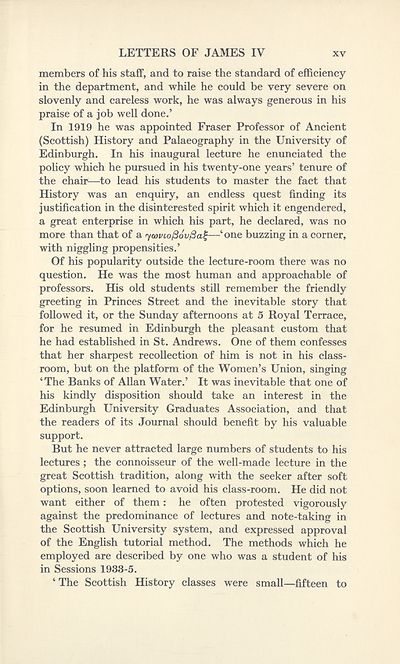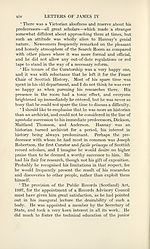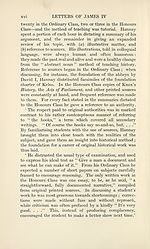Series 3 > Letters of James the Fourth, 1505-1513
(22) Page xv
Download files
Complete book:
Individual page:
Thumbnail gallery: Grid view | List view

LETTERS OF JAMES IV
xv
members of his staff, and to raise the standard of efficiency
in the department, and while he could be very severe on
slovenly and careless work, he was always generous in his
praise of a job well done.’
In 1919 he was appointed Fraser Professor of Ancient
(Scottish) History and Palaeography in the University of
Edinburgh. In his inaugural lecture he enunciated the
policy which he pursued in his twenty-one years’ tenure of
the chair—to lead his students to master the fact that
History was an enquiry, an endless quest finding its
justification in the disinterested spirit which it engendered,
a great enterprise in which his part, he declared, was no
more than that of a yavLo^dv/3a^—‘one buzzing in a corner,
with niggling propensities.’
Of his popularity outside the lecture-room there was no
question. He was the most human and approachable of
professors. His old students still remember the friendly
greeting in Princes Street and the inevitable story that
followed it, or the Sunday afternoons at 5 Royal Terrace,
for he resumed in Edinburgh the pleasant custom that
he had established in St. Andrews. One of them confesses
that her sharpest recollection of him is not in his class¬
room, but on the platform of the Women’s Union, singing
‘The Banks of Allan Water.’ It was inevitable that one of
his kindly disposition should take an interest in the
Edinburgh University Graduates Association, and that
the readers of its Journal should benefit by his valuable
support.
But he never attracted large numbers of students to his
lectures ; the connoisseur of the well-made lecture in the
great Scottish tradition, along with the seeker after soft
options, soon learned to avoid his class-room. He did not
want either of them: he often protested vigorously
against the predominance of lectures and note-taking in
the Scottish University system, and expressed approval
of the English tutorial method. The methods which he
employed are described by one who was a student of his
in Sessions 1933-5.
‘The Scottish History classes were small—fifteen to
xv
members of his staff, and to raise the standard of efficiency
in the department, and while he could be very severe on
slovenly and careless work, he was always generous in his
praise of a job well done.’
In 1919 he was appointed Fraser Professor of Ancient
(Scottish) History and Palaeography in the University of
Edinburgh. In his inaugural lecture he enunciated the
policy which he pursued in his twenty-one years’ tenure of
the chair—to lead his students to master the fact that
History was an enquiry, an endless quest finding its
justification in the disinterested spirit which it engendered,
a great enterprise in which his part, he declared, was no
more than that of a yavLo^dv/3a^—‘one buzzing in a corner,
with niggling propensities.’
Of his popularity outside the lecture-room there was no
question. He was the most human and approachable of
professors. His old students still remember the friendly
greeting in Princes Street and the inevitable story that
followed it, or the Sunday afternoons at 5 Royal Terrace,
for he resumed in Edinburgh the pleasant custom that
he had established in St. Andrews. One of them confesses
that her sharpest recollection of him is not in his class¬
room, but on the platform of the Women’s Union, singing
‘The Banks of Allan Water.’ It was inevitable that one of
his kindly disposition should take an interest in the
Edinburgh University Graduates Association, and that
the readers of its Journal should benefit by his valuable
support.
But he never attracted large numbers of students to his
lectures ; the connoisseur of the well-made lecture in the
great Scottish tradition, along with the seeker after soft
options, soon learned to avoid his class-room. He did not
want either of them: he often protested vigorously
against the predominance of lectures and note-taking in
the Scottish University system, and expressed approval
of the English tutorial method. The methods which he
employed are described by one who was a student of his
in Sessions 1933-5.
‘The Scottish History classes were small—fifteen to
Set display mode to:
![]() Universal Viewer |
Universal Viewer | ![]() Mirador |
Large image | Transcription
Mirador |
Large image | Transcription
Images and transcriptions on this page, including medium image downloads, may be used under the Creative Commons Attribution 4.0 International Licence unless otherwise stated. ![]()
| Scottish History Society volumes > Series 3 > Letters of James the Fourth, 1505-1513 > (22) Page xv |
|---|
| Permanent URL | https://digital.nls.uk/126696855 |
|---|
| Attribution and copyright: |
|
|---|
| Description | Over 180 volumes, published by the Scottish History Society, containing original sources on Scotland's history and people. With a wide range of subjects, the books collectively cover all periods from the 12th to 20th centuries, and reflect changing trends in Scottish history. Sources are accompanied by scholarly interpretation, references and bibliographies. Volumes are usually published annually, and more digitised volumes will be added as they become available. |
|---|


